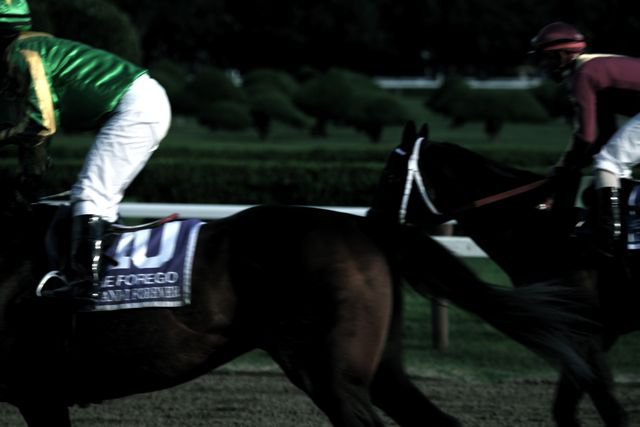
By Natalie Keller Reinert
I’m beating her as we round the corner into the homestretch, laying my whip into her flank from high above my head, slap-slap-slap on her glossless hide. The rail is whizzing by close to my left foot, just at the height of my toe in the stirrup, and I’m dizzy with fear that my boot will rub on that hard metal rail and throw off my tenuous balance, losing what little grip I have on the little exercise saddle, or that the screech and vibration will send the horse spooking into the center of the racetrack, shaking me loose, into the dirt.
Either way it will fuck up the timed work and that is already going pretty badly. Just an eighth of a mile down, three more furlongs to go, and we’re nowhere near a racing pace. Slap-slap-slap, praying she’ll react, accelerate. Slap-slap-slap. She stumbles.
**
The horse is heaving and panting, making slow painful rounds of the rutted path of the dark crowded stable we call the shedrow. The hotwalker is texting, either his girlfriend back in Mexico or his girlfriend in Barn Four. Ordinarily I’d bitch at him, dangerous to have divided attention, that horse could spook or take off, blah blah blah, but it’s obvious that this filly’s going nowhere unless he drags her there with a chain across her lip, and anyway I’m too tired and disgusted to really give a shit about what happens to him. You can only chase these guys around so much and then it’s like, fuck it, get killed by some stud colt on ‘roid rage, see if I care. There’s a million more illegal immigrants lined up, begging for seven day a week, sixteen hour a day, way below minimum wage jobs. You’re expendable, kiddo.
I’m expendable, too, which is why I don’t go into the office to hang up my hat and safety vest for the day. I don’t need to hear Eddie give me a piece of his mind about the filly’s shit timed work, and I don’t need to hear Marcus, perched next to the heater with a Silver Bullet in his hand at nine o’clock in the morning, tell me one of his stories from his Hong Kong Jockey Club glory days.
The filly is dragging one foreleg slightly when she walks, but it’s tiny and I am the only one who will notice it.
I hang up my whip and saddle in the tack room, and stalk towards the train station still wearing my hard hat and vest.
**
C.J. Hernandez is riding her in the last race, the race the secretary writes for all the also-rans of a hundred sad slow claiming races, the race for the survivors who are looking for a little prize money before they break down. She falls at the half mile pole. She was already at the back of the pack, so no one steps on Casey. No one trips over the filly. He gets to live. A pile-up is avoided, at least for the moment. Little break-downs like this don’t even make the Daily Racing Form. They barely hit the blogs.
Casey gets up, brushes the clay off his white breeches, and waits for the ambulance to come and give him a ride back to the jock’s room. The filly picks up her head, and lays it back down in the dirt.
From my corner in the top of the grandstands, which hasn’t had a crowd begin enough to fill it in decades, I throw my beer bottle. It goes crashing harmlessly into the empty boxes near the balcony’s edge.
On my way out, shuffling past the cursing West Indians and the drunken old men, I see that darling of the racing board’s marketing dreams, a young girl with her well-dressed daddy. “Daddy, did that horsey die?” the girl lisps plaintively. Her father stammers.
“You better believe she died,” I tell her as I shove past.
**
But she didn’t. She’s standing in her stall the next morning, ears at half-mast, a wrapped foreleg hoisted sorrowfully over the straw. Eddie is leaning on the stall webbing, oblivious to the pigeon shit smeared over the rubber, crooning “Hey baby, come on and see your daddy, come on now babe –” Marcus is leaning against the wall drinking a Budweiser. He’s wearing a ridiculous yellow rain poncho that swamps his little ruined body, and his hard hat buckle swings loosely under his loose-skinned neck. It’s six a.m.
“She be fine in a few day,” he says to me. “She twist she ankle – no big deal.”
“She fell,” I say flatly. “Horses get up if it’s no big deal. She didn’t get up on her own.”
“Nah,” Eddie says, turning around. He smiles whitely at me. “Nah, shit, she’s just lazy. You know that. You gotta be hitting her all the time – you know she doesn’t wanna go ‘less’n you make her.”
“When I ride in Hong Kong,” Marcus says, voice gravelly with early morning alcohol, “I ride this filly, she donwanna go for no man. No man. She stop, she buck, she lay down in the dirt. I figure her out. I stand she up, let she look around, she go straight off and win for me. You gotta get inside they head.”
“You hear that?” Eddie says. “Marcus knows, he’ll help you out. Next week, get a good breeze out of her – she’ll race good then.”
“She can’t stand up,” I say skeptically.
“Oh we get her injected,” Eddie says. “That’s no problem.”
I look at the pair of them standing before the poor broken horse.
I grew up riding horses in America’s English countryside. In Virginia, in Maryland. Steeplechase horses, jumping horses, foxhunting horses. Tough, hardy horses. You knew how to treat them, how to keep them fit and strong through hard work. You never ignored a misstep, you never ran an alcohol-soaked towel over a dull coat to bring a false shine. You figured it out, and you fixed it.
This is Queens. Things are tougher here. The horses in Eddie’s shedrow are the same as the hotwalkers and the grooms and the riders: expendable. There are always more.
The filly limps into the corner of her stall and presses her face into the wall.
I can’t watch. I can’t get on anymore of these wrecks.
I won’t be able to pay my rent. I will end up on the streets. My mother will be right.
The next time she goes out, she’ll break down. And I’ll die.
I walk out.
**
She runs better the next week. She is mid-pack in a heaving mass of straining sad sore horses when she goes down. She takes three others with her.
A pile-up makes the Form. Hell, it makes the New York Post.
I flip off the OTB channel.
**
There’s a four thirty a.m. A train I have to catch. I’m hotwalking for Joey Valentino in Barn Six now, and he starts work earlier. It’s a come-down from riding, but it buys bread and peanut butter. Valentino horses are gleaming and hot-tempered and mad with athleticism. They eat six meals a day, hand-mixed by a laughing, singing Jamaican man who has been working at racetracks since he was 12 years old. He says. Valentino horses don’t break down in cheap races. They don’t go down and die. He retires them to be jumpers, kid’s horses, pasture pets. He won’t put me on a single one of them, says I’m not good enough for his horses, but he’ll let me walk them and hose them off, and I take the job.
The siren on the racetrack goes off, and everyone in the barn does an instinctive head count of their horses. Do we have anyone out there? Could that be one of ours?
Everyone is in the barn; we were between sets of working horses. Rafael goes out to the fence to investigate. The siren can mean “loose horse” or “break-down.” It means the bored paramedics, listening to the radio in their ambulance, have work to do. It means everyone unfortunate enough to have a horse between their legs or in their grasp had better hold on tight in case something fast and loose goes galloping by.
Before Rafael comes back, the PA system crackles, sending my horse into a spasm of idiocy, and I hear, through my struggles, “Any available vet please report to the track.”
That’s it, then. Someone broke down.
The siren wails for a very long time. We’re all conscious of it, even as our horses settle and begin to walk semi-sanely again.
Rafael comes back inside. “Eddie Vernon’s gray horse. He die. And Marcus to the hospital.”
“Marcus?” I ask.
“Marcus riding he horses this week.” He looks at me. “Hey – you ride for Eddie before.”
“Yeah,” I say, jiggling the shank of my horse’s lead to keep him occupied. “Yeah, that gray horse, that’s Melodytime.”
“He die, that’s no good. Sorry.”
**
Eddie comes looking for me after training hours. I’m hosing out feed tubs, giving all the leftover oat hulls to the pigeons and the rats.
“Melodytime die out there today.”
“Yeah, I heard,” I say.
“Marcus broke his arm, his collarbone.”
“Yeah.”
“I need you.”
“No.”
“Come on.” Wheedling.
I don’t look away from my feed buckets. It could have been me. It would have been me.
Natalie Keller Reinert is a freelance writer living in Greenwood Heights. She is working on a book about her experiences with racehorses, and has published nonfiction works online and in print. Check out her website at http://nataliereinert.blogspot.com.
Do you also wanna see your work published in Sunday Read? Click here to learn how.
